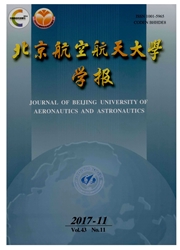

 中文摘要:
中文摘要:
无线传感器网络中目标节点定位的准确性与定位频次对跟踪与监视精度有着重要的影响.为了提高目标跟踪精度,需要研究高效的网络节点定位算法.在分析传统基于Bayesian估计过程定位的基础上,讨论可利用基于采样的序列Monte Carlo算法解决移动节点的自主定位的算法,研究了序列Monte Carlo算法在无线传感器网络节点定位中的应用.利用该方法无需对传感器网络的先验知识和对节点移动的假设,利用低密度种子节点得到定位的精度较高.理论分析和仿真实验表明,利用序列Monte Carlo算法进行定位能够充分利用移动性来提高定位的精度,Monte Carlo定位算法很大程度上提高了定位效率,能够更有效地利用传感信息,降低不确定性因素的影响.
 英文摘要:
英文摘要:
The accuracy and frequency of localization in wireless sensor networks play a crucial role in tracking and monitoring. Therefore, the study of high-efficient localization algorithm for accurate tracking is necessary. Through analyzing the traditional positioning based on Bayesian estimate process, the independent positioning of mobile node utilizing sampled sequential Monte Carlo algorithm was discussed. The application of Monte Carlo algorithm in positioning of wireless sensor networks was developed. This method has higher precision and does not need prior awareness of the wireless sensor networks and assumptions of node mobility. The algorithm maintains set of samples representing possible locations, achieves accurate localization cheaply with low seed density. Theoretical analysis and simulation experiments prove that Monte Carlo algorithm improves the positioning efficiency largely, utilizes sense information more effectively and decreases the impact of uncertainty. The properties of our technique were analyzed and experiment results from simulations were reported. The experiment results show that the sequential Monte Carlo localization technique can provide accurate localization.
 同期刊论文项目
同期刊论文项目
 同项目期刊论文
同项目期刊论文
 期刊信息
期刊信息
